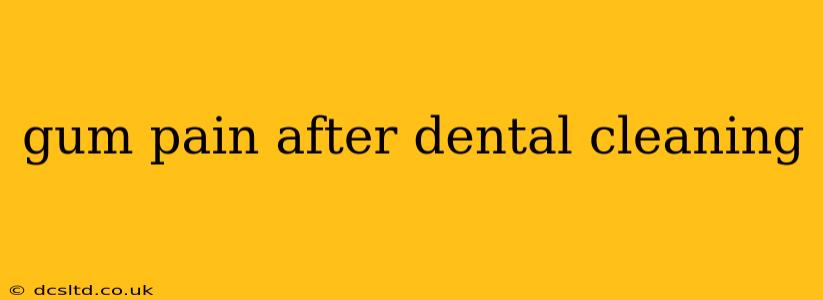Experiencing gum pain after a dental cleaning is more common than you might think. While a professional cleaning is crucial for maintaining oral health, it can sometimes cause temporary discomfort. Understanding the reasons behind this post-cleaning sensitivity is the first step towards managing and preventing it. This comprehensive guide will explore the causes of gum pain after a dental cleaning, how to prevent it, and what to do if you're experiencing discomfort.
Why Do My Gums Hurt After a Dental Cleaning?
Several factors can contribute to gum pain following a dental cleaning. The most common culprits include:
-
Inflammation: Aggressive scaling and root planing, while necessary to remove plaque and tartar buildup, can irritate the gums, leading to inflammation and subsequent pain. This is particularly true if you have gingivitis (gum disease) or periodontitis (advanced gum disease). The cleaning process itself can temporarily disrupt the gum tissue.
-
Sensitivity: The cleaning process can expose sensitive areas of the gums or tooth roots, making them more susceptible to pain and discomfort, especially to hot or cold temperatures.
-
Trauma: In rare cases, the cleaning instruments may accidentally cause minor trauma to the gums, resulting in pain and bleeding. This is less common with experienced and careful hygienists.
-
Pre-existing conditions: Individuals with existing gum disease or other oral health issues may experience more pronounced pain after a cleaning due to the increased inflammation and sensitivity in the affected areas.
How Can I Prevent Gum Pain After My Next Cleaning?
Preventing post-cleaning gum pain involves a multi-pronged approach:
-
Maintain Excellent Oral Hygiene: Regular brushing (twice daily with a soft-bristled brush) and flossing (daily) are crucial in minimizing plaque and tartar buildup, thus reducing the need for aggressive cleaning during your appointment.
-
Inform Your Dentist: If you have a history of sensitive gums or gum disease, be sure to inform your dentist or hygienist before your cleaning. They can adjust their techniques accordingly to minimize discomfort.
-
Pre-Cleaning Rinses: Some dentists recommend using a therapeutic mouthwash before your cleaning to reduce inflammation and bacteria. Discuss this option with your dental professional.
-
Post-Cleaning Care: Following your dentist’s post-cleaning instructions diligently is essential. This might involve using a specific mouthwash or applying a topical anesthetic.
What Should I Do If My Gums Are Already Hurting?
If you're experiencing gum pain after a dental cleaning, here's what you can do:
-
Rinse Gently: Rinse your mouth with warm saltwater several times a day. This helps to soothe the gums and reduce inflammation.
-
Over-the-Counter Pain Relief: Take over-the-counter pain relievers like ibuprofen or acetaminophen as directed on the packaging to manage pain and inflammation.
-
Cold Compress: Applying a cold compress to your cheek can help reduce swelling and discomfort.
-
Avoid Irritants: Avoid hot or cold foods and drinks, spicy foods, and acidic beverages until the pain subsides.
-
Contact Your Dentist: If the pain is severe, persistent, or accompanied by excessive bleeding or swelling, contact your dentist immediately. This could indicate a more serious issue that requires attention.
Is Gum Pain After a Cleaning Normal?
Some degree of temporary discomfort is considered normal after a dental cleaning, especially if you haven't had regular cleanings. However, persistent, severe pain is not. If the pain is significant or doesn't improve within a few days, it's crucial to seek professional advice from your dentist.
How Long Does Gum Pain After Cleaning Last?
The duration of gum pain varies depending on the individual and the intensity of the cleaning. Most people experience only mild discomfort that resolves within a day or two. However, in some cases, it might last for up to a week.
When Should I See a Dentist for Gum Pain?
Seek immediate dental attention if you experience:
- Severe pain that doesn't respond to over-the-counter pain relievers.
- Excessive bleeding that doesn't stop after 20 minutes of applying pressure.
- Significant swelling in your gums or jaw.
- Pus or foul-smelling discharge from your gums.
- Fever or other signs of infection.
By understanding the causes, prevention strategies, and treatment options, you can navigate the occasional discomfort associated with dental cleanings and maintain optimal oral health. Remember, regular professional cleanings are essential for preventing more serious dental problems. Always consult your dentist or hygienist if you have any concerns about your gum health.
